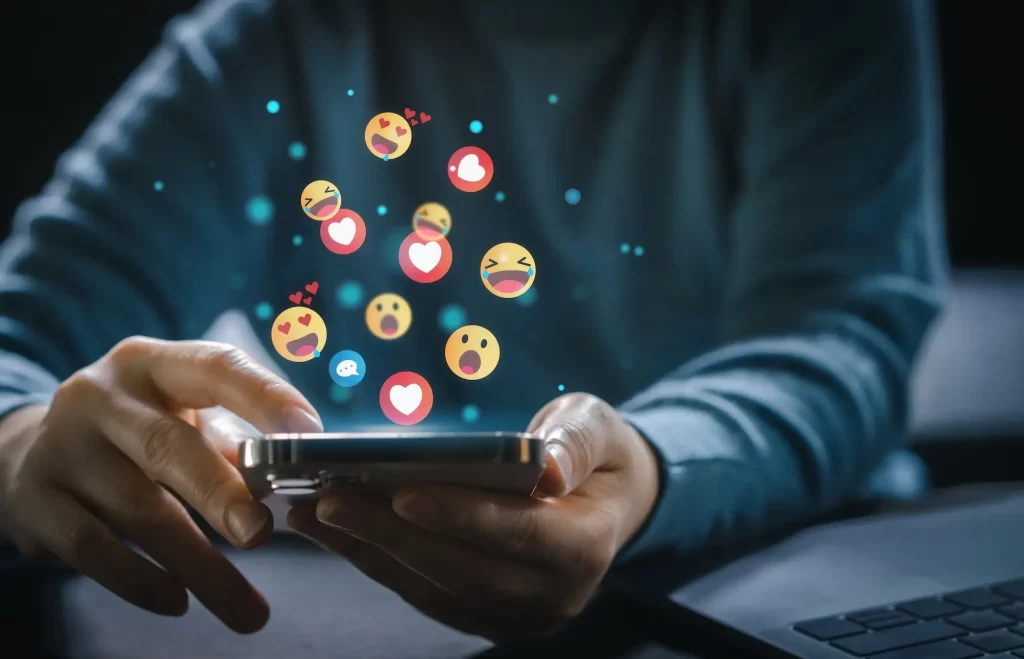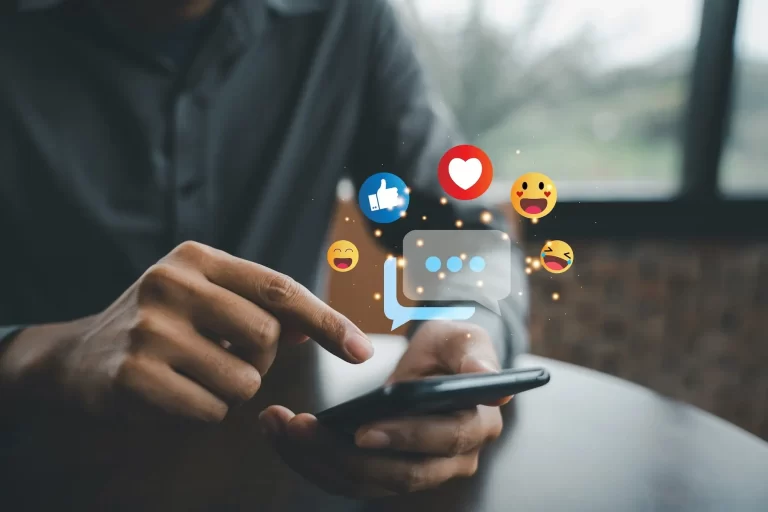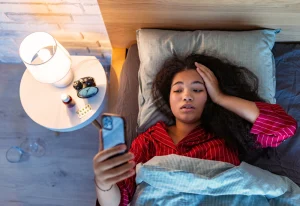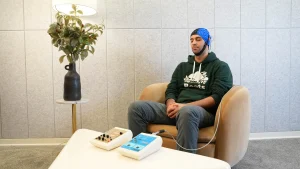In an era dominated by digital connectivity, the omnipresence of social media has transformed the way we communicate, share, and perceive the world. Despite all of the advantages these platforms provide, it’s critical to understand the intricate relationship between social media and mental health. This detailed blog will examine the multifaceted aspects of this relationship, exploring the advantages, threats, and proposing practical solutions.
Benefits:
Social Connectivity – Social media platforms serve as virtual bridges, connecting individuals across the globe. The ability to maintain relationships irrespective of geographical distances fosters a sense of community, providing emotional support and reducing feelings of isolation.
Information and Awareness – Social media acts as a powerful disseminator of information. The platforms play a vital role in raising awareness about mental health issues, breaking societal stigmas, and facilitating open conversations. Educational content shared by mental health professionals equips users with the knowledge needed to manage stress and seek appropriate assistance.
Expression and Creativity – Platforms such as Instagram, YouTube, X, and LinkedIn offer spaces for self-expression and creativity. Users can showcase talents, share achievements, and connect with like-minded individuals, contributing positively to their mental well-being.
Threats of Social Media on Mental Health
Comparison and Idealization – One of the most pervasive threats is the culture of comparison fostered by social media. Users often present curated versions of their lives, showcasing achievements, aesthetics, and experiences. This can lead to a distorted perception of reality, as individuals compare their own lives to these idealized portrayals, resulting in feelings of inadequacy, low self-esteem, and even depression.
Fear of Missing Out (FOMO) – Social media platforms provide a constant stream of updates on the activities and achievements of friends, acquaintances, and celebrities. The fear of missing out (FOMO) can instill anxiety and a sense of exclusion in individuals who perceive their own lives as less exciting or fulfilling compared to what is showcased online.
Cyberbullying – The digital realm provides a veil of anonymity, emboldening some individuals to engage in cyberbullying. Harassment, public humiliation, and the spreading of false information can have severe consequences on mental health, leading to feelings of shame, isolation, and, in extreme cases, contributing to the development of mental health disorders.
Social Isolation and Loneliness – Paradoxically, while social media connects people virtually, it can contribute to real-world social isolation. Excessive reliance on online interactions may replace face-to-face connections, leading to loneliness and feelings of disconnectedness. The quality of relationships may suffer as online interactions lack the depth and nuance of in-person communication.
Body Image Issues and Appearance Anxiety – The prevalence of carefully curated images, often enhanced with filters and editing tools, can contribute to body image issues. Constant exposure to these idealized images may lead to appearance anxiety and a desire to conform to unrealistic beauty standards, impacting self-esteem and contributing to mental health challenges such as eating disorders.
Information Overload and Anxiety – The constant flow of information on social media can be overwhelming, leading to information fatigue and heightened stress levels. Exposure to distressing news, graphic content, or a barrage of opinions on various issues can contribute to anxiety and a sense of helplessness.
Validation-Seeking Behavior – Social media platforms often operate on a system of likes, comments, and shares, creating a reward system that reinforces validation-seeking behaviour. The quest for social validation can become all-consuming, with individuals basing their self-worth on the approval of others, leading to anxiety and emotional instability.
Sleep Disruption – The addictive nature of social media, combined with the prevalence of smartphones, can contribute to sleep disturbances. Late-night scrolling and exposure to stimulating content can interfere with sleep patterns, leading to fatigue, irritability, and negatively impacting mental well-being.

Facts and Figures
Prevalence of Social Media Usage – According to a Pew Research Center survey conducted in 2021, approximately 69% of adults in the United States use some form of social media. This indicates the widespread integration of digital platforms into daily life.
Impact on Youth Mental Health – The #StatusOfMind report by the Royal Society for Public Health (RSPH) highlighted that Instagram has been identified as the social media platform with the most detrimental impact on the mental health of young people. The platform’s emphasis on visual content, appearance, and comparison contributes to higher levels of anxiety, depression, and body image concerns among users.
Associations with Depressive Symptoms – A study published in JAMA Pediatrics found a significant association between social media use and depressive symptoms among adolescents. The research revealed that adolescents who spent more than 3 hours per day on social media were more likely to report high levels of depressive symptoms.
Social Media and Sleep Disturbances – The addictive nature of social media, combined with the prevalence of smartphones, has been linked to sleep disturbances. According to research published in the Journal of Youth and Adolescence, heavy social media use, especially before bedtime, is associated with poorer sleep quality, shorter sleep duration, and increased likelihood of insomnia symptoms among adolescents.
Cyberbullying Statistics – The National Center for Education Statistics reported that during the 2018-2019 school year, approximately 20% of students aged 12-18 reported being bullied. Of those, 15% experienced bullying through electronic means, including social media platforms. Cyberbullying can have severe consequences on mental health, leading to increased levels of stress, anxiety, and depression.
Social Media and Body Image Concerns – The Dove Global Beauty and Confidence Report found that 60% of women globally avoid certain activities because they feel insecure about their appearance. The report linked these insecurities to the influence of social media, where unrealistic beauty standards are often perpetuated, contributing to body image concerns.
Digital Well-Being Initiatives – In response to the growing concerns about the impact of social media on mental health, several technology companies have initiated digital well-being features. For instance, Apple introduced Screen Time, allowing users to monitor and control their device usage. Similarly, Instagram implemented tools such as “You’re All Caught Up” to remind users to take breaks from endless scrolling.
Evolving Landscape of Social Media – The social media landscape is dynamic, with emerging platforms and shifting user demographics. Understanding these changes is essential for adapting mental health interventions to meet the evolving needs of diverse user groups.
Implications and Considerations – While the statistics provide valuable insights, it’s important to recognize individual differences and the complex interplay of various factors contributing to mental health outcomes.
Longitudinal studies tracking the mental health of social media users over time would offer a more comprehensive understanding of the cumulative effects.
Ongoing research is needed to explore the potential positive aspects of social media use, as some users report benefits such as finding support networks and educational resources.
By staying informed about these facts and figures, individuals, policymakers, and mental health professionals can develop targeted strategies to mitigate the negative impact of social media on mental well-being while fostering a healthy digital environment.
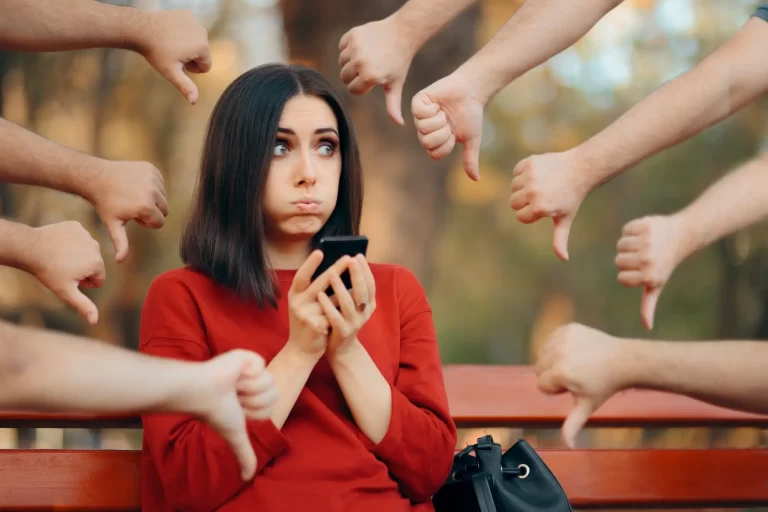
Solutions
Digital Literacy – Promote digital literacy to help users critically analyze and filter information. Encourage an understanding of the curated nature of social media, emphasizing that what is shared represents highlights rather than the complete reality of individuals’ lives.
Healthy Usage Habits – Advocate for mindful social media use, suggesting regular breaks and setting time limits. Encourage users to curate their feeds, unfollowing accounts that trigger negative emotions, and prioritizing content that uplifts and inspires.
Support Systems – Strengthen offline relationships to provide a real-world support system. Educate individuals on the importance of seeking professional help if they experience persistent mental health challenges.
Neurofeedback & Photobiomodulation – Neurofeedback and Photobiomodulation (PBM) are innovative approaches that show potential in addressing various aspects of mental health.
Neurofeedback benefits:
Enhancing Emotional Regulation – Neurofeedback may help individuals develop better emotional regulation strategies. Given that social media can evoke strong emotional responses, learning to regulate these emotions through neurofeedback could contribute to a more balanced mental state.
Improving Attention and Focus – Social media’s constant stimuli can contribute to attention and focus challenges. Neurofeedback, by targeting improvements in attention, may indirectly assist individuals in managing their online interactions more mindfully.
Stress Reduction – Social media engagement, especially in the face of cyberbullying or negative comparisons, can lead to heightened stress. Neurofeedback techniques aimed at reducing stress responses may help individuals cope more effectively with online stressors.
Photobiomodulation (PBM) benefits:
Addressing Sleep Disruptions – The addictive nature of social media can contribute to disrupted sleep patterns. PBM has shown promise in improving sleep quality, potentially aiding individuals in establishing healthier sleep routines despite digital distractions.
Mood Regulation – PBM’s impact on mood regulation could be beneficial for individuals facing emotional challenges exacerbated by social media. It may contribute to a more stable emotional state, reducing vulnerability to the emotional rollercoaster often induced by online interactions.
Cognitive Function Enhancement – Social media overload can contribute to information fatigue and cognitive strain. PBM’s potential cognitive-enhancing effects may aid individuals in maintaining mental clarity and focus despite the cognitive demands of online engagement.
Conclusion
In navigating the intricate relationship between social media and mental health, acknowledging the nuanced dynamics is imperative. By embracing responsible use, promoting awareness, and advocating for improvements at both individual and platform levels, we can harness the positive aspects of social media while mitigating potential negative impacts on our mental well-being.
Elumind Centres for Brain Excellence is an integrated mental health centre offering solutions that can help you with your mental/brain health needs. To start your journey, book your FREE 15-MINUTE PHONE CONSULTATION. We are here for you.


